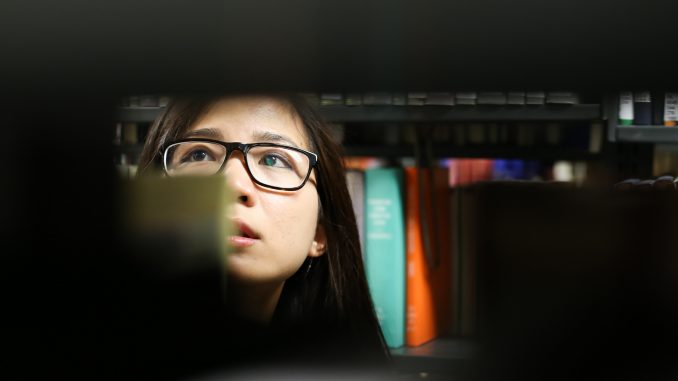
In the small Cambodian village of Saang, Angkeakeo Hak’s neighbors taught her English. They would meet her in the evenings and charge her 5 cents per hour, she said.
In 2009, Hak moved from Saang to Philadelphia.
She began taking courses, like English as a second language, at the Community College of Philadelphia. She planned to return to Cambodia after she received her associate’s degree in international relations.
But after consulting with advisors and professors, Hak transferred to Temple her junior year.
In November 2014, the 27-year-old student brought her passion for the English language and her Cambodian culture together when she was chosen to be a part of the White House Initiative for Obamacare.
But at first, Hak’s move to the U.S. was shocking, mostly because she wasn’t expecting as much diversity.
“I thought I would only meet American people, but when I got here, people are from everywhere around the globe,” Hak said.
When Hak first started classes at Temple in Fall 2014, she said the idea of being an English major didn’t come to mind.
Hak decided her best path was to major in English after becoming interested in teaching the language in Cambodia.
“Sometimes I feel like I don’t really talk much, but I want to communicate with people through my writing,” Hak said.
Hak was initially interested in working with immigrants in the Philadelphia area. In her early weeks at Temple, she received a teaching position at a nonprofit organization called Boat People SOS, a national Vietnamese American group that assists refugees who are resettling their lives in the U.S.
Hak taught ESL to a group of about 20 elderly South Asian refugees.
“She has an intuitive gift to assess the rules for the syntax of language,” said Joyce Joyce, chairperson of the English department.
In early 2014, Hak met Amy Jones, the health and social services director of the Southeast Asian Mutual Assistance Associations Coalition, a refugee organization that seeks to inform Southeast Asian immigrants of their eligibilities for health care and social services.
Jones reached out to Hak because she was in need of a translator who could inform the Asian-American community about the benefits of Obamacare. Hak said that although the work would be unpaid, she had no qualms.
“I just wanted to help my community,” Hak said.
The translation was published and distributed around the Cambodian community near 7th Street and Snyder Avenue, Hak said.
A few months after her short translation project, Jones sent Hak an email offering her a job as a Cambodian counselor to personally inform immigrant clients about Obamacare.
Hak said she learned a vast amount of information through online training about the concerns of immigrants and resolutions of applying for Obamacare.
Her work for SEAMAAC continued to grow,and in late December 2014, Hak was invited to be a part of a video segment for the White House Initiative on Asian Americans and Pacific Islanders, which was recorded at the U.S. Department of Health and Human Services in Washington D.C.
Hak said the White House has been persistently working to get the Cambodian, Burmese, Hmong and Laos populations familiar with Obamacare, because all four populations are currently underserved.
Hak was involved in a question-and-answer video session titled “Learning about the Affordable Care Act in Khmer,” the native language in Cambodia.
In the video, Hak is interviewed by Narin Jameson, a Cambodian woman who serves as an activist for Southeast Asian refugees.
“I felt like I could spread the word to every Cambodian person in America,” Hak said.
Hak received widespread praise from friends and family back home.
Her Chinese Contents professor, Yun Zhu, posted the video on the Chinese language website at Temple to spread knowledge of Obamacare.
Hak also has a creative writing concentration within her major. For her Advanced Fiction Writing course, she wrote two stories – both about a 14-year-old girl who was forced to get married.
The stories were based off her experiences in her home country of Cambodia – where, she said, arranged marriages are more expected than in America.
“I wanted people here to get a taste of what our life was like [in Cambodia],” Hak said.
Hak, who expects to graduate in May, said she is torn between going home to teach English, as she first planned, or staying in the U.S. and working as a journalist for SEAMAAC.
“Like a professor-momma bear, I see Ang working at the Cambodian Embassy as a translator,” Joyce said.
As someone who struggled with adapting to American culture, Hak said she would enjoy continuing to help Southeast Asians understand their eligibilities.
“It’s not only the ESL classes, but sometimes you have to sit down and encourage them to move on because they are refugees and immigrants,” Hak said. “I feel like I have the need to stay and give them a hand.”
Emily Scott can be reached at emily.ivy.scott@temple.edu.


Be the first to comment